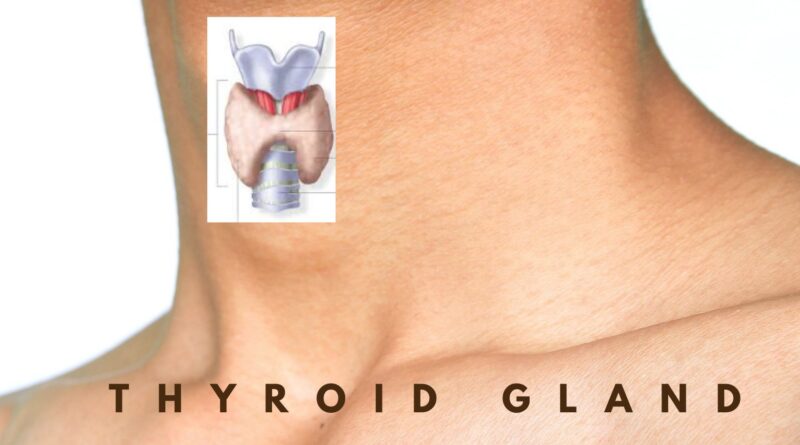Thyroid Problems – what you need to know ?

The thyroid is a small gland located in the neck that produces hormones that help regulate metabolism and other important bodily functions. Thyroid problems occur when the gland produces too much or too little of these hormones.
There are several types of thyroid problems, including:
- Hypothyroidism: a condition in which the thyroid gland doesn’t produce enough thyroid hormones. Symptoms may include fatigue, weight gain, depression, and constipation.
- Hyperthyroidism: a condition in which the thyroid gland produces too much thyroid hormone. Symptoms may include weight loss, anxiety, tremors, and increased heart rate.
- Thyroid nodules: growths on the thyroid gland that can be either benign or cancerous.
- Thyroiditis: inflammation of the thyroid gland that can cause temporary hypothyroidism or hyperthyroidism.
Thyroid problems can affect people of all ages and genders, but they are more common in women and older adults. They can be diagnosed with a physical exam, blood tests, and imaging studies. Treatment depends on the type and severity of the condition and may include medication, surgery, or radioactive iodine therapy.
It’s important to talk to your doctor if you experience any symptoms of a thyroid problem, as early diagnosis and treatment can prevent complications and improve quality of life.
What are the symptoms of thyroid problems?
The symptoms of thyroid problems can vary depending on the type and severity of the condition. However, some common symptoms of thyroid problems include:
Hypothyroidism:
- Fatigue and weakness
- Weight gain
- Sensitivity to cold
- Constipation
- Dry skin and hair
- Depression
- Muscle aches and stiffness
- Joint pain
- Slow heart rate
- Irregular menstrual periods
Hyperthyroidism:
- Rapid heartbeat
- Anxiety and nervousness
- Tremors in the hands and fingers
- Weight loss
- Increased appetite
- Heat intolerance
- Sweating
- Difficulty sleeping
- Muscle weakness
- Thinning of the skin and hair
- Irregular menstrual periods
Thyroid nodules:
- A lump or swelling in the neck
- Difficulty swallowing or breathing
- Hoarseness or voice changes
- Pain or discomfort in the neck
Thyroiditis:
- Pain or discomfort in the neck
- Swelling or tenderness in the thyroid gland
- Fever
- Fatigue
- Muscle aches and stiffness
- Joint pain
If you experience any of these symptoms, it’s important to talk to your doctor,
What are the hormones produced by thyroid gland?
The thyroid gland produces two main hormones:
- Triiodothyronine (T3): T3 is the active form of thyroid hormone and is produced in smaller amounts than thyroxine (T4). T3 helps regulate metabolism, growth, and development, and plays a role in the maintenance of body temperature and energy levels.
- Thyroxine (T4): T4 is the most abundant hormone produced by the thyroid gland. It is converted into T3 in other tissues of the body. T4 also helps regulate metabolism, growth, and development, and plays a role in the maintenance of body temperature and energy levels.
These hormones are regulated by a feedback system that involves the hypothalamus and pituitary gland. The hypothalamus produces thyrotropin-releasing hormone (TRH), which signals the pituitary gland to produce thyroid-stimulating hormone (TSH). TSH then signals the thyroid gland to produce T3 and T4.
The production and release of thyroid hormones is critical for maintaining normal body function. Too much or too little of these hormones can cause a range of health problems and can impact metabolism, growth, and development.
What is the function of thyroid gland in human body?
The thyroid gland plays an important role in regulating many bodily functions through the production and release of thyroid hormones. Some of the functions of the thyroid gland include:
- Regulating metabolism: Thyroid hormones help regulate metabolism, which is the process by which the body converts food into energy. They increase the rate at which cells use energy and can impact weight, body temperature, and energy levels.
- Supporting growth and development: Thyroid hormones are important for normal growth and development, especially in infants and children. They help regulate the growth and development of bones, muscles, and organs.
- Supporting brain function: Thyroid hormones are important for brain development and function, including memory, mood, and cognitive function.
- Regulating heart rate and blood pressure: Thyroid hormones help regulate heart rate and blood pressure by controlling the amount of oxygen that cells use and the amount of blood that circulates in the body.
- Maintaining body temperature: Thyroid hormones help regulate body temperature by increasing the body’s metabolic rate and heat production.
Overall, the thyroid gland plays a crucial role in maintaining normal body function and regulating many important processes. When the thyroid gland produces too much or too little thyroid hormone, it can lead to a range of health problems and impact overall health and wellbeing
19 signs of thyroid problems thyroid problems

Here are 19 signs and symptoms of thyroid problems in both males and females:
- Fatigue and weakness
- Weight gain or difficulty losing weight
- Sensitivity to cold or feeling cold all the time
- Constipation
- Dry skin and hair
- Hair loss
- Irregular menstrual periods or heavy periods
- Low sex drive
- Depression or anxiety
- Memory problems or brain fog
- Muscle aches and pains
- Joint pain and stiffness
- Hoarseness or voice changes
- Swollen neck or goiter
- Difficulty swallowing or choking sensation
- Increased heart rate or palpitations
- Tremors or shaking hands
- Sweating
- Heat intolerance
It’s important to note that not everyone with thyroid problems will experience all of these symptoms, and some people may not have any symptoms at all. Additionally, some symptoms may be more common in women than in men, such as irregular menstrual periods or heavy periods. If you are experiencing any of these symptoms, it’s important to talk to your doctor to determine the cause and receive appropriate treatment.
Excess Production of thyroid Hormones:
Excess production of thyroid hormones is known as hyperthyroidism. This condition occurs when the thyroid gland produces too much thyroxine (T4) and/or triiodothyronine (T3). Its called hyperthyroidism.
Some common causes of hyperthyroidism include:
- Graves’ disease: This is an autoimmune disorder that causes the thyroid gland to produce too much thyroid hormone.
- Thyroid nodules: A thyroid nodule is a growth in the thyroid gland that can cause the gland to produce too much thyroid hormone.
- Thyroiditis: This is inflammation of the thyroid gland that can cause excess thyroid hormone to be released into the bloodstream.
- Excessive iodine intake: In some cases, excessive iodine intake, such as from dietary supplements or medication, can cause hyperthyroidism.
Thyroid Storm
Thyroid storm, also known as thyrotoxic crisis, is a rare but life-threatening complication of hyperthyroidism. It occurs when there is a sudden and severe worsening of hyperthyroidism symptoms, leading to a medical emergency. Thyroid storm is most commonly seen in people with undiagnosed or poorly controlled hyperthyroidism, but can also occur in people undergoing treatment for hyperthyroidism.
Some common symptoms of thyroid storm include:
- High fever (above 101.3°F or 38.5°C)
- Rapid heartbeat (above 130 beats per minute)
- Agitation, confusion or delirium
- Nausea, vomiting or diarrhea
- Tremors or seizures
- Sweating or flushing
- Difficulty breathing or shortness of breath
- Abdominal pain
- Coma
Thyroid storm is a medical emergency that requires immediate treatment in a hospital. Treatment may include medications to control thyroid hormone production, beta-blockers to reduce heart rate and blood pressure, and supportive care to manage symptoms and complications. In severe cases, intensive care and mechanical ventilation may be necessary. If you suspect that you or someone you know may be experiencing thyroid storm, seek emergency medical attention immediately.
Deficient Production of Thyroid hormones
Deficient production of thyroid hormones is known as hypothyroidism. This condition occurs when the thyroid gland does not produce enough thyroxine (T4) and/or triiodothyronine (T3). Some common causes of hypothyroidism include:
- Hashimoto’s thyroiditis: This is an autoimmune disorder that damages the thyroid gland, leading to decreased thyroid hormone production.
- Surgical removal of the thyroid gland: If the thyroid gland is removed surgically, the body will no longer be able to produce thyroid hormones, and hypothyroidism will result.
- Radiation therapy: Radiation therapy to the neck area, often used to treat cancer, can damage the thyroid gland and lead to hypothyroidism.
- Certain medications: Some medications, such as lithium, interferon, and amiodarone, can interfere with thyroid hormone production and cause hypothyroidism.
Some common signs and symptoms of hypothyroidism include:
- Fatigue and weakness
- Weight gain or difficulty losing weight
- Sensitivity to cold or feeling cold all the time
- Constipation
- Dry skin and hair
- Hair loss
- Irregular menstrual periods or heavy periods
- Low sex drive
- Depression or anxiety
- Memory problems or brain fog
- Muscle aches and pains
- Joint pain and stiffness
- Hoarseness or voice changes
- Swollen neck or goiter
If left untreated, hypothyroidism can lead to complications such as high cholesterol, heart problems, and myxedema coma, which is a life-threatening condition characterized by extreme hypothyroidism.
Enlarged thyroid gland -the Goiter
An enlarged thyroid gland, or goiter, is a condition that results from the abnormal growth of the thyroid gland. The thyroid gland, which is located in the neck, produces hormones that regulate metabolism and other body functions. In some cases, the thyroid gland can grow too large, causing a visible swelling in the neck, which is known as a goiter.

Most cases of goiter are not harmful, and the enlargement of the thyroid gland is usually painless. However, in some cases, a large goiter can cause symptoms such as difficulty breathing or swallowing, coughing, or hoarseness.
Treatment for goiter depends on the underlying cause and the severity of the condition. In some cases, the goiter may shrink on its own over time, especially if it is caused by iodine deficiency. Other treatment options may include medications to control thyroid hormone production, surgery to remove the thyroid gland, or radioactive iodine therapy.
What is a Thyroid Nodule?
A thyroid nodule is a growth or lump that forms within the thyroid gland, which is located in the neck. Thyroid nodules are relatively common, and most of them are benign, meaning they are not cancerous. In some cases, however, a thyroid nodule may be cancerous and require treatment.
Most thyroid nodules do not cause any symptoms, and they are usually discovered during a routine physical examination or imaging tests such as ultrasound or CT scan. However, some larger nodules may cause symptoms such as difficulty swallowing or breathing, hoarseness, or a visible lump in the neck.
If a thyroid nodule is suspected, the doctor may order additional tests, such as a fine-needle aspiration biopsy, to determine if the nodule is cancerous. Treatment for thyroid nodules depends on the size, location, and nature of the nodule. In some cases, the doctor may recommend monitoring the nodule over time to see if it changes in size or requires treatment. Other treatment options may include medications to control thyroid hormone production, surgery to remove the nodule, or radioactive iodine therapy.
Two main diseases of the thyroid gland
The two main diseases of the thyroid gland are:
- Hypothyroidism: This is a condition in which the thyroid gland does not produce enough thyroid hormones. Hypothyroidism can be caused by a variety of factors, including autoimmune disorders such as Hashimoto’s thyroiditis, iodine deficiency, radiation therapy to the neck, and certain medications. Symptoms of hypothyroidism can include fatigue, weight gain, cold intolerance, dry skin, constipation, and depression.
- Hyperthyroidism: This is a condition in which the thyroid gland produces too much thyroid hormone. Hyperthyroidism can be caused by autoimmune disorders such as Graves’ disease, thyroid nodules, or thyroiditis. Symptoms of hyperthyroidism can include weight loss, increased appetite, heat intolerance, sweating, anxiety, tremors, and rapid heartbeat.
Both hypothyroidism and hyperthyroidism can be diagnosed through blood tests that measure the levels of thyroid hormones in the body. Treatment for these conditions depends on the underlying cause and may include medications, radioactive iodine therapy, or surgery to remove part or all of the thyroid gland.
How would you know if you have thyroid problem?
If you have any of 19 symptoms mentioned above in the article you need to immediately visit the doctor.
The diagnosis of thyroid problems involves a combination of medical history, physical examination, and laboratory tests. Here are some common methods used to diagnose thyroid problems:
- Medical history: The doctor will ask questions about your symptoms, medical history, and family history of thyroid problems.
- Physical examination: The doctor will examine your neck for any signs of swelling or nodules and check for other physical symptoms such as hair loss or weight changes.
- Blood tests: Blood tests can measure the levels of thyroid hormones and thyroid-stimulating hormone (TSH) in the body. High levels of TSH and low levels of thyroid hormones suggest hypothyroidism, while low levels of TSH and high levels of thyroid hormones suggest hyperthyroidism.
- Thyroid ultrasound: An ultrasound of the thyroid gland can provide detailed images of the gland and any nodules or abnormalities.
- Fine-needle aspiration biopsy: This involves using a thin needle to extract cells from a thyroid nodule for analysis to determine if it is cancerous.
- Radioactive iodine uptake test: This test measures the amount of radioactive iodine taken up by the thyroid gland, which can help diagnose hyperthyroidism
Cancer of thyroid gland
Thyroid cancer is a rare type of cancer that develops in the cells of the thyroid gland, which is located in the neck. I have seen in my clinical practice that its not very common, it actually common in Russia, Ukraine and Belarus after Chernobyl Catastrophe.
The most common types of thyroid cancer include:
- Papillary thyroid cancer: This is the most common type of thyroid cancer, accounting for about 80% of cases. It develops in the follicular cells of the thyroid gland and typically grows slowly.
- Follicular thyroid cancer: This type of thyroid cancer also develops in the follicular cells of the thyroid gland and tends to grow more quickly than papillary thyroid cancer.
- Medullary thyroid cancer: This type of thyroid cancer develops in the C cells of the thyroid gland, which are responsible for producing calcitonin. It tends to grow more quickly than papillary or follicular thyroid cancer.
- Anaplastic thyroid cancer: This is a rare and aggressive form of thyroid cancer that develops in the undifferentiated cells of the thyroid gland.
Symptoms of thyroid cancer can include a lump or swelling in the neck, difficulty swallowing or breathing, hoarseness, or persistent cough. Thyroid cancer is often diagnosed through a combination of medical history, physical examination, and imaging tests such as ultrasound, CT scan, or MRI. A fine-needle aspiration biopsy may also be performed to determine if the nodule is cancerous.
Treatment for thyroid cancer depends on the type and stage of the cancer, but may include surgery to remove part or all of the thyroid gland, radioactive iodine therapy, external radiation therapy, or chemotherapy. With early detection and treatment, the prognosis for thyroid cancer is generally good, with a high cure rate.
Summary
The thyroid gland is an important endocrine gland that produces hormones that regulate metabolism and other bodily functions. Thyroid problems can arise when the gland produces too much or too little hormones, leading to conditions such as hyperthyroidism and hypothyroidism.
Symptoms of thyroid problems can include weight changes, fatigue, hair loss, and mood changes. Diagnosis of thyroid problems involves a combination of medical history, physical examination, and laboratory tests such as blood tests, thyroid ultrasound, and fine-needle aspiration biopsy.
Treatment for thyroid problems depends on the underlying cause and severity of the condition and may include medications, radioactive iodine therapy, or surgery.
Thyroid cancer is a rare type of cancer that develops in the thyroid gland and is often diagnosed through a combination of medical history, physical examination, and imaging tests.
Treatment for thyroid cancer may include surgery, radioactive iodine therapy, external radiation therapy, or chemotherapy.





Very useful and clear cut information. Everything is neatly described and beautifully explained.